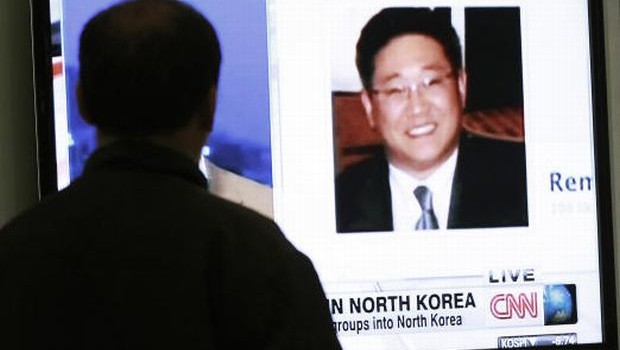
A South Korean man watches a television news program showing Korean American Kenneth Bae at the Seoul Railway Station in Seoul, South Korea, Thursday, May 2, 2013. (AP Photo)
Bae, 44, was born in South Korea but is a naturalised American citizen and attended the University of Oregon. According to US media, he most recently lived in the Seattle suburb of Lynnwood.
A North Korean defector said Bae will likely serve his sentence in a special facility for foreigners, not in one of the repressive state’s forced labour camps. More than 200,000 people are incarcerated in these camps, beaten and starved, sometimes to death, according to human rights groups.
Bae’s sentencing comes after two months of sabre-rattling by Pyongyang that saw North Korea threaten both the United States and South Korea with nuclear war.
Former UN Ambassador Bill Richardson, who has made numerous trips to North Korea that included efforts to free detained Americans, in a statement said Bae’s case should not become entangled in the current US-North Korea impasse.
“Now that the sentencing and the North Korean legal process has been completed, it is important that negotiations begin to secure Kenneth Bae’s release on humanitarian grounds or a general amnesty,” said Richardson, who visited North Korea in January with Google Inc CEO Eric Schmidt.
Former US President Jimmy Carter, who has traveled to North Korea before to try to free a detained American, has no plans to do so for Bae, Carter’s spokeswoman said.
“President Carter has not had an invitation to visit North Korea and has no plans to visit,” Carter’s press secretary, Deanna Congileo, said in an email.
Bae is believed to be a devout Christian, according to human rights activists in South Korea, who say he may have been arrested for taking pictures of starving children, known as kotjebi, or fluttering swallows.
He was part of a group of five tourists who visited the northeastern North Korean city of Rajin in November and has been held since then.
Some media reports have identified Bae as the leader of the tour group. NK News, a specialist North Korea news website, said he was the owner of a company called Nation Tours that specialised in tours of northeastern North Korea.
The reports could not be verified and North Korean state news agency KCNA did not list any specific charge other than crimes against the state, and used a Korean rendering of Bae’s name, Pae Jun-ho, when it reported the Supreme Court ruling.
“North Korea has shown their intention to use him as a negotiating card as they have done in the past,” said Cheong Seong-chang, senior fellow at the Sejong Institute, a think-tank in Seoul.
Bae’s sentence was heftier than the 12 years handed down to two US journalists, Laura Ling and Euna Lee, in 2009. It took a visit to Pyongyang by former President Bill Clinton to secure their release.
North Korea appears to use the release of high profile American prisoners to extract a form of personal tribute, rather than for economic or diplomatic gain, often portraying visiting dignitaries as paying homage.
According to North Korean law, the punishment for hostile acts against the state is between five and 10 years hard labor.
“I think his sentencing was hefty. North Korea seemed to consider his acts more severe,” said Jang Myung-bong, honorary professor at Kookmin University in Seoul and a North Korea law expert.
North Korea is one of the most isolated states on earth. Its official policy of Juche, or self-reliance, is a fusion of Marxism, extreme nationalism and self-sufficiency centred on the cult of the ruling Kim family.
BAE WILL NOT likely be incarcerated in one of the North’s notorious slave labor camps, such as the one where defector Kwon Hyo-jin was locked up. There, Kwon said, prisoners were worked to death and often survived only by eating rats and snakes.
“If an American served jail together with North Korean inmates, which won’t happen, he could tell them about capitalism or economic developments. That would be the biggest mistake for North Korea,” said Kwon, a North Korean sentenced to one of its camps for seven years until 2007. He defected to South Korea in 2009.
“[Bae] would be sent to a correctional facility that only houses foreigners and was set up as a model for international human rights groups.”
It was not known if Bae had been taken immediately to jail.
Ling, the journalist, told US television that she was placed in a 5-by-6 foot cell when captured and then kept in a regular room afterwards.
Bae was given counsel by the Swedish Embassy in Pyongyang, which has declined to comment on the case, as the United States does not have diplomatic relations with the North.
